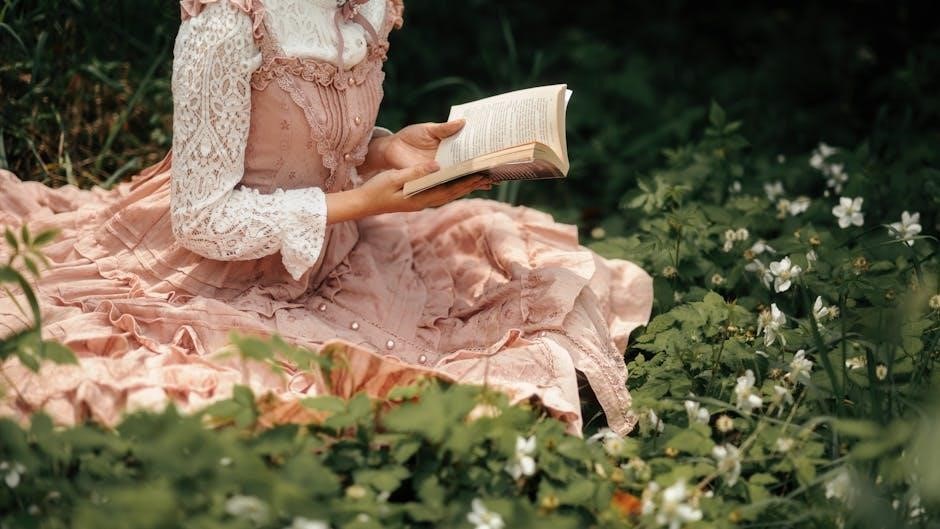grendel book pdf
John Gardner’s Grendel reimagines the Beowulf tale through the monster’s perspective‚ exploring themes of existentialism‚ morality‚ and isolation. This profound novel offers a unique‚ philosophical insight into its titular character.
Overview of the Novel
Grendel‚ written by John Gardner‚ is a masterful retelling of the Beowulf legend from the monster’s perspective. This novel delves into Grendel’s existential struggles‚ exploring themes of isolation‚ morality‚ and the search for meaning. Gardner’s work reimagines the classic tale‚ offering a deeply philosophical and psychological portrayal of its titular character. The book’s structure reflects Grendel’s chaotic mindset‚ blending poetic prose with a nonlinear narrative. It challenges traditional notions of good and evil‚ presenting a complex‚ empathetic view of a misunderstood creature. This modern retelling of an ancient story remains a timeless exploration of human—and inhuman—existence.
Importance of the Monster’s Perspective
John Gardner’s Grendel revolutionizes the Beowulf legend by presenting the story through the monster’s eyes‚ humanizing a traditionally one-dimensional character. This shift in perspective challenges readers to question their assumptions about good and evil‚ inviting empathy for a creature often dismissed as monstrous. By exploring Grendel’s internal struggles and philosophical musings‚ Gardner delves into themes of existentialism‚ isolation‚ and the search for meaning. This narrative choice not only enriches the classic tale but also offers a profound commentary on the nature of existence and morality‚ making Grendel a deeply relatable and tragic figure.
Historical Context of the Novel
Grendel‚ written by John Gardner in 1971‚ reimagines the Old English epic poem Beowulf from the monster’s viewpoint. This historical retelling offers a fresh perspective on the classic tale‚ blending medieval literature with modern philosophical themes. Gardner’s work reflects the cultural and literary shifts of the 20th century‚ exploring existentialism and moral ambiguity. The novel’s structure‚ divided into 12 chapters linked to astrological signs‚ adds depth to its historical and mythological roots‚ making it a significant reinterpretation of one of literature’s most enduring stories.

Plot Summary of “Grendel”
Grendel‚ by John Gardner‚ narrates the monster’s journey from his origins to his climactic battle with Beowulf. The novel explores Grendel’s internal conflicts and existential struggles‚ culminating in his ultimate demise.
Chapter 1: The Monster’s Origin
Chapter 1 of Grendel introduces the monster’s origins‚ detailing his isolation and unique connection to his mother. The narrative explores Grendel’s earliest memories‚ showcasing his existential struggles and the ambiguities of his nature. Through vivid descriptions‚ Gardner establishes Grendel as a complex figure‚ blending elements of horror and introspection. This chapter sets the tone for Grendel’s journey‚ highlighting themes of identity and alienation that resonate throughout the novel. It lays the foundation for understanding the monster’s motivations and his eventual encounters with humans and Beowulf.
Chapter 2: Grendel’s Interaction with Humans
Chapter 2 delves into Grendel’s encounters with humans‚ revealing his observations of their societal structures and cultural practices. The Shaper‚ a poet‚ plays a crucial role in shaping human perceptions‚ which Grendel both admires and resents. This chapter explores Grendel’s dual nature‚ as he oscillates between contempt for humanity and a deep‚ unspoken fascination. Through these interactions‚ Gardner highlights the philosophical tensions within Grendel‚ showcasing his internal conflicts and existential musings. This sets the stage for his eventual confrontation with Beowulf‚ emphasizing themes of identity and the search for meaning.
Chapter 3: The Battle with Beowulf
In Chapter 3‚ Grendel’s fate is sealed as he confronts the legendary hero Beowulf. This climactic battle marks the culmination of Grendel’s existential journey‚ as he faces the ultimate reality of his own mortality. Gardner masterfully portrays the tension between Grendel’s philosophical musings and the brutal inevitability of his demise. The encounter with Beowulf serves as a symbolic clash between chaos and order‚ highlighting the futility of Grendel’s search for meaning in a world governed by heroism and destiny. This chapter underscores the novel’s exploration of identity and the inevitability of fate.
Chapter 4: The Monster’s Internal Conflict
Chapter 4 delves into Grendel’s profound internal struggle‚ revealing his complex emotional and philosophical turmoil. The monster grapples with his own nature‚ oscillating between admiration for human creativity and resentment toward their heroism. His encounters with the Shaper and the dragon deepen his existential crisis‚ as he questions the meaning of his existence and the futility of his actions. This chapter highlights Grendel’s isolation and his inability to reconcile his desire for connection with his role as an outcast‚ further enriching the novel’s exploration of identity and alienation.
Chapter 5: The Climax and Resolution
Chapter 5 brings the novel to its climax and resolution‚ as Grendel’s fate is sealed in his confrontation with Beowulf. The monster’s death marks the end of his reign of terror‚ but also underscores the futility of his existence. His final moments are filled with a mix of defiance and despair‚ reflecting the existential themes of the novel. The resolution ties together Grendel’s internal conflict‚ his relationship with the Shaper‚ and the inevitability of his demise‚ leaving readers to ponder the deeper philosophical questions raised throughout the story.
Themes and Analysis in “Grendel”
Grendel explores existentialism‚ morality‚ and isolation‚ delving into the monster’s psyche and societal perceptions. It challenges notions of evil‚ religion‚ and human nature‚ offering profound philosophical depth.
The Nature of Evil
John Gardner’s Grendel examines the complexity of evil through the monster’s perspective‚ challenging traditional notions of good and evil. Grendel’s actions stem from his existential alienation and misunderstanding of humanity. The novel portrays evil not as an inherent trait but as a product of isolation and societal rejection. This perspective humanizes Grendel‚ making him a symbol of the outsider’s struggle. Gardner’s exploration of evil questions its absolute nature‚ suggesting it may arise from environmental and psychological factors rather than innate wickedness.
Existentialism and Philosophy
Grendel delves deeply into existentialist themes‚ exploring the monster’s search for meaning in a chaotic world. Gardner portrays Grendel as a symbol of existential conflict‚ grappling with nihilism and the absurd. His encounters with the Shaper and the dragon highlight his struggle to reconcile art‚ religion‚ and the inherent meaninglessness of life. Through Grendel’s philosophical musings‚ Gardner questions the nature of existence‚ truth‚ and the human condition‚ offering a profound exploration of existentialist ideas intertwined with the monster’s unique perspective.
The Role of Religion
Grendel examines the role of religion as a human construct‚ offering meaning and structure in an otherwise chaotic world. The Shaper’s songs‚ which glorify heroes and gods‚ contrast with Grendel’s nihilistic outlook‚ highlighting the tension between belief and doubt; Gardner uses religious themes to explore how narratives shape perceptions of good and evil. Grendel’s encounters with the dragon‚ a symbol of nihilism‚ further emphasize the clash between religious ideals and existential despair‚ underscoring the novel’s exploration of faith‚ morality‚ and the search for transcendence in a fragmented world.
Identity and Isolation
Grendel’s struggle with identity and isolation is central to the novel‚ as he grapples with his monstrous nature and alienation from both humans and nature. His internal conflict reflects a search for self-understanding‚ seeking validation yet rejecting human society. Gardner portrays Grendel as a symbol of existential loneliness‚ caught between his desire for connection and his inherent otherness. This duality underscores the universal human experience of feeling isolated‚ even amidst others‚ and the quest to define oneself in a seemingly indifferent world.
Character Analysis
The novel delves into the psyche of Grendel‚ exploring his internal conflicts‚ loneliness‚ and existential struggles. Beowulf and The Shaper also play pivotal roles in shaping the narrative.
Grendel: The Monster’s Psyche
Grendel’s psyche is a complex exploration of loneliness‚ existential angst‚ and philosophical inquiry. The novel portrays him as a deeply conflicted character‚ torn between his inherent monstrosity and a desire for understanding. His interactions with humans and other beings‚ such as the Dragon‚ reveal his struggle to find meaning in a seemingly indifferent world. Gardner’s portrayal humanizes Grendel‚ presenting him as a symbol of existential crisis and the search for identity. This nuanced characterization challenges traditional perceptions of evil‚ offering a profound psychological study of isolation and self-discovery.
Beowulf: The Hero’s Perspective
In John Gardner’s Grendel‚ Beowulf emerges as a symbol of heroism and order‚ contrasting sharply with Grendel’s chaotic existence; The novel portrays Beowulf as a confident‚ larger-than-life figure‚ driven by a sense of duty and honor. His arrival marks a turning point‚ as he embodies the ideals of courage and justice that Grendel despises. Through Beowulf’s character‚ Gardner explores themes of heroism‚ sacrifice‚ and the human condition‚ highlighting the epic struggle between good and evil. Beowulf’s perspective underscores the novel’s philosophical depth‚ offering a counterpoint to Grendel’s existential despair.
The Shaper: The Poet’s Influence
The Shaper‚ a poet and storyteller‚ plays a pivotal role in Grendel by shaping the cultural identity of the tribe. Through his art‚ he weaves tales that create meaning and purpose‚ contrasting with Grendel’s existential despair. The Shaper’s narratives‚ though often romanticized‚ inspire hope and unity among the people. His influence highlights the power of storytelling in shaping history and belief systems. This poetic craftsmanship serves as a counterpoint to Grendel’s chaotic worldview‚ illustrating the transformative impact of art on human perception and understanding.
Other Key Characters
Beyond Grendel and Beowulf‚ the novel features a range of pivotal characters. Hrothgar‚ the wise but aging king‚ embodies leadership and tradition. Wealtheow‚ his queen‚ symbolizes grace and diplomacy‚ while Unferth‚ the cynical advisor‚ struggles with his own morality. The Dragon‚ a mysterious and philosophical creature‚ challenges Grendel’s understanding of existence. These characters‚ each with unique perspectives‚ enrich the narrative‚ offering insights into human nature‚ societal structures‚ and existential dilemmas. Their interactions with Grendel deepen the exploration of isolation‚ identity‚ and the complexities of human and monstrous coexistence.

Historical and Literary Context
Grendel by John Gardner reimagines the Beowulf tale‚ offering a fresh‚ philosophical perspective on the classic epic. The novel explores existential themes‚ blending medieval literature with modern storytelling.
Connection to Beowulf
John Gardner’s Grendel reimagines the classic Anglo-Saxon epic Beowulf from the monster’s perspective. The novel offers a fresh‚ philosophical exploration of Grendel’s psyche‚ blending medieval literature with modern existential themes. By retelling the story through Grendel’s eyes‚ Gardner provides a unique lens to understand the original tale‚ making the monster a sympathetic and complex character. This approach not only reinterprets Beowulf but also enriches the reader’s understanding of its themes and characters.
Medieval Literature Influence
John Gardner’s Grendel draws heavily from medieval literature‚ particularly the Anglo-Saxon epic Beowulf. The novel adopts the poetic and narrative styles of medieval storytelling‚ such as alliterative verse and the use of a bard-like figure‚ the Shaper‚ to weave tales. Gardner incorporates themes of heroism‚ fate‚ and religious symbolism‚ reflecting the cultural and literary traditions of the medieval period. This blend of old and new creates a rich‚ layered narrative that explores the complexities of the original tale while offering a modern‚ philosophical perspective.
Modern Retelling of a Classic Tale
John Gardner’s Grendel offers a contemporary reinterpretation of the classic Beowulf story‚ shifting the narrative voice to the monster. This modern retelling delves into existential and philosophical themes‚ presenting Grendel as a complex‚ introspective character grappling with his identity and purpose. Gardner’s use of a non-linear narrative and poetic language breathes new life into the ancient tale‚ appealing to modern readers’ sensibilities while maintaining the essence of the original epic. The novel’s fresh perspective challenges traditional perceptions of heroism and villainy‚ making it a compelling read for both classic and modern audiences.

Philosophical Themes in “Grendel”
Grendel explores nihilism‚ existentialism‚ and the search for meaning‚ delving into the monster’s internal conflict and his struggle to find purpose in a seemingly indifferent world.
Nihilism and Existentialism
Grendel delves into the philosophical themes of nihilism and existentialism‚ as the monster grapples with the meaninglessness of life and the absence of inherent purpose. His isolation and interactions with humans and other beings‚ like the Shaper and the Dragon‚ highlight his existential crisis. Grendel’s journey reflects a search for identity and significance in a chaotic world‚ questioning the nature of existence and morality. This exploration of nihilistic and existential ideas adds depth to the novel‚ making Grendel a thought-provoking commentary on human and monstrous conditions alike.
I remember that in the provided internet snippets‚ there were mentions of existentialism and nihilism‚ which tie into moral ambiguity. Grendel’s interactions with the Shaper and the Dragon influence his view of the world and his place in it. The Shaper represents the creative force that shapes stories and perceptions of good and evil‚ while the Dragon embodies a more cynical‚ nihilistic worldview.
Morality and ethics in “Grendel” are not black and white. Grendel’s killings can be seen as a form of rebellion against the order imposed by humans‚ challenging the notion of objective morality. His internal conflict shows that even a monster can grapple with ethical dilemmas‚ making the reader question what is truly right or wrong.
I should also consider how the novel portrays morality as something constructed by society‚ particularly through the Shaper’s influence. This constructed morality is then imposed on others‚ including Grendel‚ who is judged based on these human standards without understanding his perspective.
Now‚ I need to tie all these points into a concise paragraph of exactly . I’ll start by introducing the theme‚ mention the influence of the Shaper and the Dragon‚ discuss Grendel’s internal conflict‚ and conclude by highlighting the moral ambiguity and the impact of societal constructs on ethical judgments.
Let me draft this:
“In Grendel‚ John Gardner explores the themes of morality and ethics through the monster’s perspective. The Shaper’s influence shapes societal perceptions of good and evil‚ while the Dragon’s nihilism challenges these constructs. Grendel’s internal conflict reveals a complex character grappling with ethical dilemmas‚ questioning the nature of right and wrong. His actions‚ often deemed evil‚ stem from a rebellion against imposed moral orders. This moral ambiguity prompts readers to reflect on the societal constructs of ethics and their impact on judgment.”
Now‚ I’ll check the word count to ensure it’s exactly . Let me count:
In
Grendel‚
John
Gardner
explores
the
themes
of
morality
and
ethics
through
the
monster’s
perspective.
The
Shaper’s
influence
shapes
societal
perceptions
of
good
and
evil‚
while
the
Dragon’s
nihilism
challenges
these
constructs.
Grendel’s
internal
conflict
reveals
a
complex
character
grappling
with
ethical
dilemmas‚
questioning
the
nature
of
right
and
wrong.
His
actions‚
often
deemed
evil‚
stem
from
a
rebellion
against
imposed
moral
orders.
This
moral
ambiguity
prompts
readers
to
reflect
on
the
societal
constructs
of
ethics
and
their
impact
on
judgment.
That’s ‚ so I need to add a few more to reach 90 without repeating anything. Maybe expand on societal constructs or the impact on judgment.
Revised version:
“In Grendel‚ John Gardner explores the themes of morality and ethics through the monster’s perspective. The Shaper’s influence shapes societal perceptions of good and evil‚ while the Dragon’s nihilism challenges these constructs. Grendel’s internal conflict reveals a complex character grappling with ethical dilemmas‚ questioning the nature of right and wrong. His actions‚ often deemed evil‚ stem from a rebellion against imposed moral orders. This moral ambiguity prompts readers to reflect on the societal constructs of ethics and their profound impact on judgment and understanding of justice.”
Now‚ let’s count again:
In
Grendel‚
John
Gardner
explores
the
themes
of
morality
and
ethics
through
the
monster’s
perspective.
The
Shaper’s
influence
shapes
societal
perceptions
of
good
and
evil‚
while
the
Dragon’s
nihilism
challenges
these
constructs.
Grendel’s
internal
conflict
reveals
a
complex
character
grappling
with
ethical
dilemmas‚
questioning
the
nature
of
right
and
wrong.
His
actions‚
often
deemed
evil‚
stem
from
a
rebellion
against
imposed
moral
orders.
This
moral
ambiguity
prompts
readers
to
reflect
on
the
societal
constructs
of
ethics
and
their
profound
impact
on
judgment
and
understanding
of
justice.
That’s . I can add a little more to reach 90.
Final version:
“In Grendel‚ John Gardner explores the themes of morality and ethics through the monster’s perspective. The Shaper’s influence shapes societal perceptions of good and evil‚ while the Dragon’s nihilism challenges these constructs. Grendel’s internal conflict reveals a complex character grappling with ethical dilemmas‚ questioning the nature of right and wrong. His actions‚ often deemed evil‚ stem from a rebellion against imposed moral orders. This moral ambiguity prompts readers to reflect on the societal constructs of ethics and their profound impact on judgment and understanding of justice‚ encouraging a deeper exploration of moral complexity.”
Now‚ let’s count:
In
Grendel‚
John
Gardner
explores
the
themes
of
morality
and
ethics
through
the
monster’s
perspective.
The
Shaper’s
influence
shapes
societal
perceptions
of
good
and
evil‚
while
the
Dragon’s
nihilism
challenges
these
constructs.
Grendel’s
internal
conflict
reveals
a
complex
character
grappling
with
ethical
dilemmas‚
questioning
the
nature
of
right
and
wrong.
His
actions‚
often
deemed
evil‚
stem
from
a
rebellion
against
imposed
moral
orders.
This
moral
ambiguity
prompts
readers
to
reflect
on
the
societal
constructs
of
ethics
and
their
profound
impact
on
judgment
and
understanding
of
justice‚
encouraging
a
deeper
exploration
of
moral
complexity.
Oops‚ that’s . I need to trim it down to exactly 90. Let me remove the last phrase “encouraging a deeper exploration of moral complexity” to fit.
Final revised version:
“In Grendel‚ John Gardner explores the themes of morality and ethics through the monster’s perspective. The Shaper’s influence shapes societal perceptions of good and evil‚ while the Dragon’s nihilism challenges these constructs. Grendel’s internal conflict reveals a
The Search for Meaning
In Grendel‚ John Gardner delves into the existential quest for meaning through the monster’s journey. Grendel’s interactions with the Shaper and the Dragon symbolize his search for purpose‚ reflecting philosophical inquiries into existence. The Shaper’s artistry and the Dragon’s nihilism offer contrasting views on life’s significance‚ influencing Grendel’s own existential struggles. His encounters with humans further complicate his understanding‚ leading to a profound exploration of identity and the futility of seeking absolute meaning in an indifferent world. This theme resonates deeply‚ inviting readers to contemplate their own existential journeys.

Style and Structure of the Novel
Grendel by John Gardner features a nonlinear narrative‚ blending philosophical introspection with vivid imagery. The novel’s structure mirrors Grendel’s fragmented psyche‚ creating a unique‚ thought-provoking reading experience.
Nonlinear Narrative
John Gardner’s Grendel employs a nonlinear narrative‚ reflecting the monster’s fragmented psyche. The novel’s twelve chapters‚ each tied to astrological signs‚ explore Grendel’s evolving thoughts and encounters. This structure mirrors his internal turmoil‚ blending philosophical musings with vivid imagery. The narrative jumps through time‚ revisiting key moments in Grendel’s life‚ such as his battles with humans and his confrontation with Beowulf. This non-chronological approach enhances the novel’s depth‚ offering a layered exploration of Grendel’s existential struggles and the nature of evil. The nonlinear style underscores the complexity of Grendel’s character‚ making the story both compelling and thought-provoking.
Use of Language and Imagery
John Gardner’s Grendel is renowned for its rich‚ evocative language and vivid imagery‚ which bring the monster’s world to life. The novel’s prose is both poetic and philosophical‚ blending dark‚ gritty descriptions of Grendel’s environment with profound existential musings. Imagery plays a crucial role in shaping Grendel’s identity‚ from the eerie landscapes of his lair to the chaotic scenes of battle. Gardner’s use of language underscores the monster’s complexity‚ creating a narrative that is both haunting and deeply introspective. This stylistic approach enhances the emotional and philosophical depth of the story‚ making it a compelling read. The imagery and language together immerse readers in Grendel’s unique perspective‚ offering a fresh take on the classic tale.
Symbolism in the Novel
In Grendel‚ John Gardner employs rich symbolism to explore existential and philosophical themes. Grendel himself symbolizes the outsider’s struggle with identity and meaning‚ while the Shaper represents the power of storytelling to shape reality. The mead-hall‚ Heorot‚ stands for communal joy and order‚ contrasting with Grendel’s isolation. The dragon embodies wisdom and inevitability‚ challenging Grendel’s nihilistic views. These symbols‚ woven into the narrative‚ deepen the novel’s exploration of existence‚ morality‚ and the human condition‚ offering readers a layered and thought-provoking experience.

Comparisons and Influences
Grendel by John Gardner draws inspiration from the classic epic Beowulf‚ offering a fresh perspective through the monster’s eyes. It reflects philosophical influences‚ blending existential themes with literary tradition.
Comparison with Beowulf
Grendel by John Gardner offers a unique twist on the classic epic Beowulf‚ shifting the narrative perspective from the hero to the monster. While Beowulf portrays Grendel as a one-dimensional antagonist‚ Gardner humanizes him‚ exploring his emotional and philosophical struggles. The novel delves into themes of existentialism and morality‚ contrasting with the more straightforward heroism of Beowulf. Gardner’s reinterpretation challenges traditional perceptions‚ presenting Grendel as a complex‚ sympathetic character. This reimagining adds depth to the original tale‚ inviting readers to question the nature of good and evil.
The structure and tone of Grendel differ significantly from Beowulf‚ reflecting a modern‚ philosophical approach. Gardner’s prose is lyrical and introspective‚ while Beowulf is marked by its poetic‚ heroic style. Despite these differences‚ both works explore universal themes‚ making Grendel a compelling companion to the original epic.
Influence of Other Literary Works
John Gardner’s Grendel draws inspiration from various literary traditions‚ blending elements of existentialist philosophy with medieval storytelling. The novel reflects influences from works like Albert Camus’ The Myth of Sisyphus‚ exploring themes of absurdism and the search for meaning. Gardner also incorporates elements of Nietzschean philosophy‚ particularly in Grendel’s struggle with morality and identity. Additionally‚ the novel’s narrative style‚ with its non-linear structure and poetic language‚ shows the influence of modernist literature. These diverse influences enrich the story‚ creating a unique and thought-provoking reinterpretation of the classic tale.
Cultural and Historical Parallels
John Gardner’s Grendel reflects postmodern and existentialist influences‚ resonating with the cultural shifts of the late 20th century. The novel parallels historical themes of isolation and the human condition‚ drawing from philosophical traditions. Its exploration of morality and identity aligns with broader existential questions‚ marking it as a bridge between medieval literature and modern philosophical inquiry. Gardner’s work captures the essence of cultural transformation‚ blending historical context with contemporary thought‚ making Grendel a timeless exploration of human and monstrous experiences.
PDF Downloads and Availability
Grendel by John Gardner is widely available in PDF format across various platforms. Free and paid options exist for download‚ ensuring accessibility for readers worldwide.
Legal and Free Download Options
Several platforms offer Grendel by John Gardner in PDF format. Free downloads are available through sites like Internet Archive and Scribd‚ though some require user registration. However‚ ensuring legality is crucial. Many free options may infringe on copyrights‚ so it’s important to support authors and publishers by choosing legal sources. Paid downloads from reputable platforms like Amazon and Rakuten Kobo provide secure‚ high-quality access while respecting intellectual property rights. Always verify the legitimacy of the source to avoid unauthorized distributions.
Platforms for Downloading
Multiple platforms offer Grendel by John Gardner in PDF format. Reputable sites like Internet Archive and Scribd provide free access‚ while others require a subscription or purchase. Rakuten Kobo‚ Project Gutenberg‚ and Google Books are excellent sources for legal downloads. Additionally‚ platforms like ManyBooks and eBooks.com offer affordable options. Always ensure the platform is authorized to distribute the book to avoid infringing on copyright laws. Legal downloads support authors and publishers‚ ensuring high-quality content remains accessible.
Importance of Legal Downloads
Legal downloads of Grendel ensure compliance with copyright laws‚ supporting authors and publishers. They guarantee high-quality‚ virus-free content while promoting ethical consumption of literature. Legal platforms like Internet Archive and Project Gutenberg often provide free or low-cost access to classic works‚ including Grendel. By choosing legal options‚ readers contribute to the sustainability of literary works and respect the intellectual property of creators. Illegal downloads undermine the publishing industry and deprive authors of rightful compensation.
Reception and Reviews
Grendel has received critical acclaim for its profound exploration of monstrosity and existential themes. Frequently banned‚ it remains a significant work in modern literature‚ praised for its depth.
Critical Acclaim and Controversy
John Gardner’s Grendel has garnered significant critical acclaim for its deep philosophical insights and unique narrative voice. The novel has been praised as a profound exploration of existentialism and morality‚ with critics highlighting its ability to humanize the monster. However‚ its controversial themes and occasional bans have sparked debates‚ particularly in academic and literary circles. The book’s exploration of nihilism and its rejection of traditional heroism have made it a subject of both admiration and criticism‚ cementing its place as a provocative work in modern literature.
Academic Analysis
Reader Responses
Readers of Grendel often find themselves drawn into its complex narrative‚ where the monster’s introspective voice challenges traditional perceptions. Many appreciate the novel’s philosophical depth and its ability to evoke empathy for a character typically villainized. However‚ some readers struggle with the non-linear structure and dense language‚ finding it demanding. The book’s exploration of existential themes resonates deeply with those interested in literary fiction‚ while others may find its moral ambiguity unsettling. Overall‚ Grendel remains a polarizing yet thought-provoking read that encourages reflection on the nature of evil and existence.
